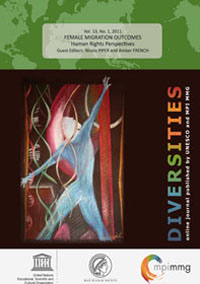Shaking up the Grounds for Human Trafficking on Hispaniola
by Bridget Wooding (FLACSO, Dominican Republic)
To cite this article: Wooding, B. (2011). Shaking up the Grounds for Human Trafficking on Hispaniola. Diversities, 13(1), 67–81. https://doi.org/10.58002/ftga-gj90
The migration of Haitian women to the Dominican Republic is part of the so-called “feminization of migrations” caused by changes in labour markets as well as the precarious situation of women and their families in the neighbouring country of origin. The sequel to the earthquake in Haiti on January 12, 2010 has aggravated gender violence, in the makeshift camps in which hundreds of thousands of displaced persons are still living a year later, according to the reporting of human rights organizations, international organizations, women’s organizations and ordinary citizens. Although the unprecedented urban displacement provoked by the earthquake has not led to a stampede of Haitians attempting to cross the border to the western side of the island of Hispaniola, it has exposed migrants, particularly women, to new situations of vulnerability which may lead to human trafficking. This paper seeks to characterize the evolving situation. It examines how there is a new opportunity for civil society activists to direct attention towards possible humanitarian gaps as regards Haitian migrant women who have crossed the border, helping inter alia to strengthen protection measures across the island, in part because the issue of gender violence in Haiti has become more visible than previously.
|
